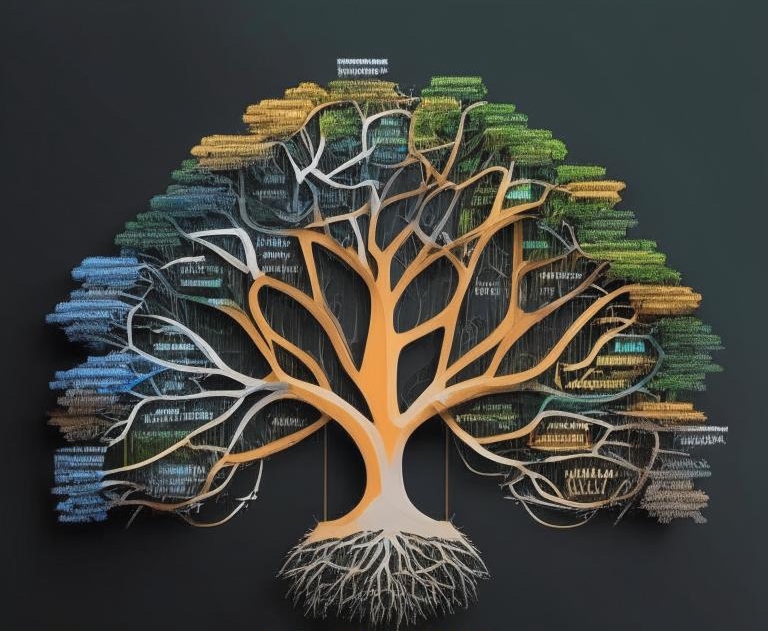Conceptualization
by Oleg Sovetnik
Conceptualization is the process of forming concepts and categories that allow for structuring and making sense of reality. Through this process, individuals create abstractions that reflect the essential features of objects, phenomena, and their relationships. These abstractions then become the foundation for building more complex cognitive models and systems.
Conceptualization plays a key role in any scientific or practical activity because it determines how information will be interpreted and used to solve specific tasks. In an epistemological context, conceptualization serves as the basis for knowledge formation, ensuring coherence between objects of study and their theoretical understanding.
Conceptualization as the Basis for Umwelt
The concept of Umwelt, as understood by Jakob von Uexküll, describes the subjective world of perception. This world is formed through the lens of individual cognitive structures that determine how a subject perceives and understands the surrounding environment. Conceptualization, in this context, becomes the tool through which the Umwelt is created.
Umwelt is not merely the sum of all perceptions; it is a system in which objects and phenomena gain meaning through conceptualization. Concepts act as filters through which the subject interacts with reality, determining what will be perceived and understood, and what will remain outside the boundaries of subjective perception.
Creating Umwelt Through Conceptual Schemes
In the process of creating Umwelt, we can identify two levels of conceptual schemes that define different aspects of perception and understanding.
First-order concepts are basic, direct elements associated with primary data from perception. In programming, these concepts can be compared to values. A value in programming represents specific data used to express meanings. Similarly, first-order concepts play the role of initial elements in forming cognitive schemas: these can be basic categories such as color, shape, or speed.
Second-order concepts, on the other hand, represent more complex abstractions that describe not only individual objects but also their relationships. In programming, these concepts can be compared to entities, which combine multiple values and connections into one conceptual structure. They allow the subject’s Umwelt to comprehend complex structures, such as social systems, interactions, or methods of interpreting meanings.
Thus, first-order concepts form the foundation for building complex conceptual systems, while second-order concepts organize this foundation into more intricate cognitive structures, enabling the subjective world (Umwelt) to adapt to and interact with reality on a higher level of abstraction.
Conceptualization as an Epistemological Practice
In epistemology, conceptualization is a practice that allows the subject not only to make sense of reality but also to participate in the creation of knowledge. The conceptual schemas developed through conceptualization serve as cognitive tools through which the subject analyzes and explains the world.
Conceptualization affects how the research object will be defined and which aspects of reality will be considered significant. Ultimately, the process of conceptualization determines the research methodology and sets directions for further theoretical analysis. In this sense, conceptualization is an integral part of scientific practice, as it defines what we see and how we understand it.
The Role of Conceptualization in Solving the “Babylon Problem”
The “Babylon Problem” describes a situation where different participants in a project (e.g., developers, analysts, and clients) use different languages and conceptual schemas, hindering mutual understanding and collaborative work. Conceptualization plays a key role in solving this problem, as it helps develop common conceptual schemas that can serve as a “bridge” between different groups.
The process of creating a shared Umwelt allows participants to interact through a unified system of concepts and categories, eliminating misunderstandings and ensuring effective collaboration. In this sense, conceptualization becomes the foundation for creating a shared cognitive space in which complex projects can be worked on collectively.
Examples of Conceptualization in Scientific Practice and Programming
Scientific practice constantly encounters the need to create new concepts to describe complex phenomena. For example, the concept of “gravity” in physics is the result of conceptualization, which allowed for linking multiple observable phenomena (falling objects, orbital movements of planets) into one theoretical framework.
In programming, conceptualization also plays a crucial role. When developers create a program’s architecture, they define key entities and their relationships, using concepts that can be described through classes and objects. These concepts, whether values or entities, organize information, and modules and functions define how the program will interpret them.
Thus, conceptualization in programming is the same process as in science—the creation of cognitive schemas that structure information and direct the subject’s (in this case, the program’s) actions in solving specific tasks.
Conceptualization is the foundation of both scientific knowledge and practical activity, as it allows for the creation of cognitive schemas necessary for understanding and interacting with reality.
sociology theory conceptualization domain umwelt
